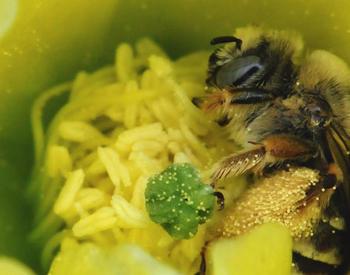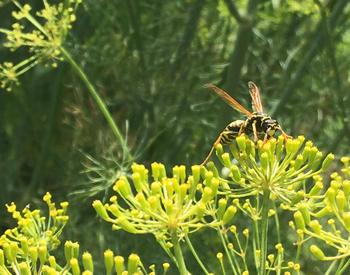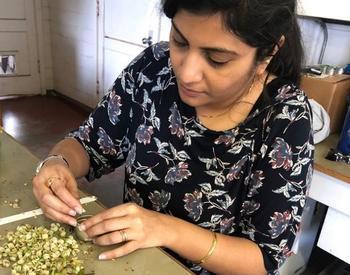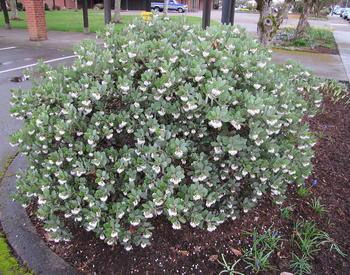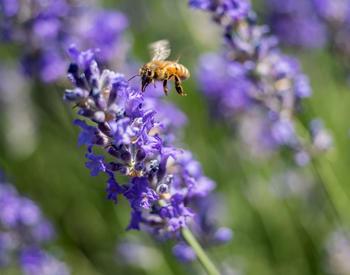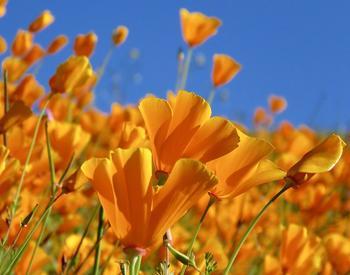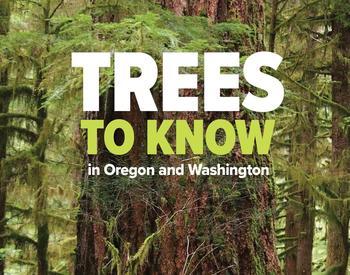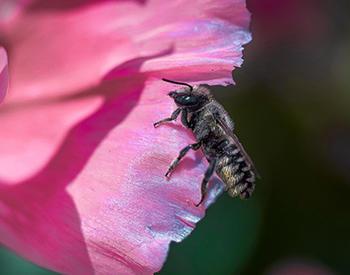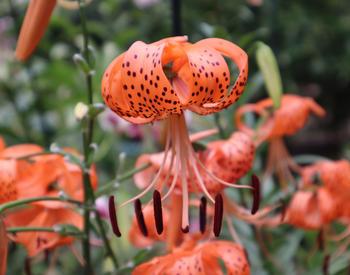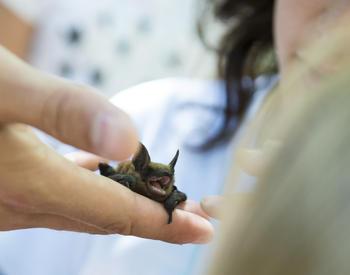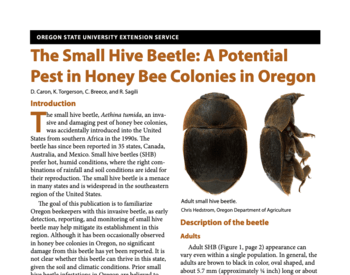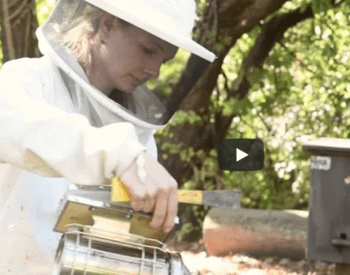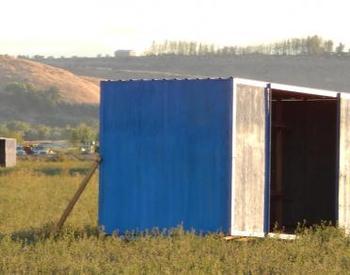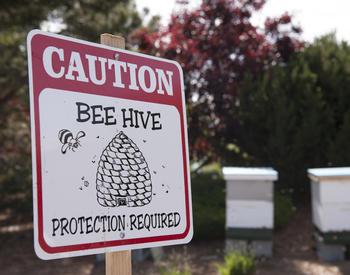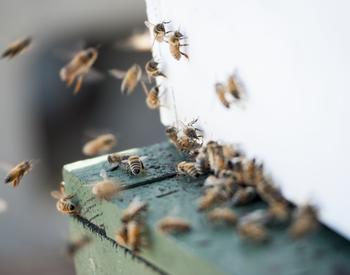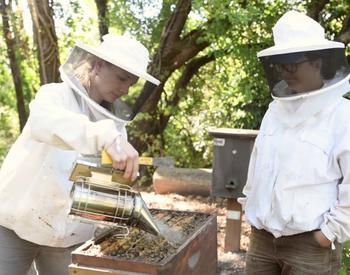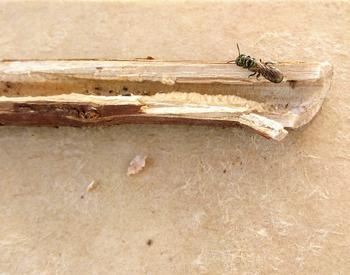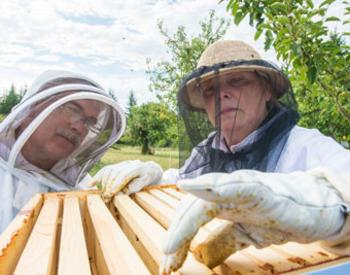Transcript
Speaker 1: From the Oregon State University Extension Service, this is Pollination, a podcast that tells the stories of researchers, land managers, and concerned citizens making bold strides to improve the health of pollinators.
I'm your host, Dr. Adoni Melopoulos, assistant professor in pollinator health in the Department of Horticulture. Oregon is a pretty amazing place for bees and that's in part because of the very heterogeneous agriculture we have across the state. I'm going to be exploring that linkage over the next couple of weeks by talking to some of the most innovative and interesting growers that we have here in Oregon. I begin this week in a sunflower field late in the summer talking with Garth Mulkey of GS3 Quality Seeds, Inc. GS3 is owned by Garth and Susan Mulkey. They are fourth-generation seed farmers in this beautiful region of Oregon called the Willamette Valley between Portland and Eugene. They've been in the same place since 1966 and they have been practicing no-till farming for over 15 years. They're really innovative farmers. In this episode, we're also joined by Kristy Buckland, who's an extension specialist at Oregon State University, and Sarah Kincaid with the Oregon Department of Agriculture. Also featured in this episode is Tim Weidronik, a beekeeper who works with Garth Mulkey from Corvallis. Also just a quick shout-out, this episode is supported by a grant from the Western Sustainable Agriculture Research and Education Program. So come along and join us for a little walk through a sunflower field.
This is a special episode. We have this podcast pollination and we are doing it in Garth Mulkey's sunflower field. This is the first time we've done a podcast in a field. In a field?
Yeah, it's awesome. And in a sunflower field? In a sunflower field. Multiple firsts a day. We're breaking all the rules. Oh, wow. And we're here today to talk about two things. Garth, you are involved in two initiatives. The one is the flagship farm program and also you're with the specialty seed growers of Western Oregon and you guys have come up with the bee protection protocol. So we want to talk to you about how the importance of crops like this to bees and how to grow them so that bees do really well. And we're seeing a lot of bees in here.
Speaker 2: There are a lot of bees. It's a beautiful morning and we got all kinds here. Sarah, how many kinds of bees do we have?
Speaker 1: Ten kinds of bees so far. Ten kinds of bees and we're only like a meter or two into, oh, sorry, feet. I'm still Canadian. Oh, wow. A few feet into the field. So why are you growing this? The sunflowers here are for seed.
Speaker 2: They are for seed. This is a hybrid production field. The seed will get sent to the Midwest, I believe, and used in a specialty sunflower production there. Probably a high, oh boy. There's a word I'm missing. It's a really special seed. It's a really special type of sunflower, yes.
Speaker 1: And I guess that's one thing I think a lot of people are unaware of. Here in Oregon, we grow a lot of seeds for the rest of the country and the world. Absolutely.
Speaker 2: Yeah, there's a seed on our farm that gets shipped all around the world.
Speaker 1: Why is this a place to grow specialty seeds?
Speaker 2: Well, mostly because we have great farmers like myself. But the reality is it's our climate. You know, we're right here. We're 40 miles from the Pacific Ocean. It's a dry climate in the springtime. So we have low disease pressure. We have low overnight temperatures, which extends the growing season, which gives us days and days to fill the seed. If we were 100 degrees in the day and night, it would really compress the amount of time we've got to fill seeds. We get very good yields here. Gotcha.
Speaker 1: And I guess so a lot of these crops need bees to be able to, well, they have two things, I guess. One, they feed the bees, and the other part is the bees are necessary to set the seed.
Speaker 2: Oh, absolutely. And it's even more critical in our hybrid productions because, in this field, we have four rows of what we'll call female plants and two rows of what we call male. So the bees are responsible for going to the male plants and carrying the pollen to the female plants.
Speaker 1: Okay, explain this. So there's a female, what is a male and a female plant?
Speaker 2: Well, the females in this one actually do not produce their pollen. They are pollen-neutral. Okay. So we have to have the pollen from the male to fertilize the females.
Speaker 1: So the bees are going to go from these plants over to those plants to get a seed.
Speaker 2: Yeah. So if we don't have bees, we don't harvest seed. All right. And so you've got bees here. We have lots of bees here. And we have the... And we have a beekeeper, don't we? We have here in the field, just growing in the field is Tim Weidronik, a beekeeper from Corvallis. You brought bees in for pollination. Do you do a lot of pollination? And what's involved with getting colonies ready for pollination?
Speaker 3: Well, the first thing is just to make sure they're healthy and treat them and make sure the mitelode's extremely low.
Speaker 1: Okay. So make sure these colonies are coming in because you've got an exchange here with Garth. So you bring the bees in and you got to make sure they're strong enough to do the pollination. Correct.
So they got to be going between these rows and crossing all day long, working hard. Do your bees... When you go into pollination, do the bees grow on the crop?
Speaker 3: Yeah, they do grow on the crop, especially depending on the crop. This is my first year at Sunflower. Okay. So I'm anxious to see how I do on it. But I've done a vetch and facility for Garth, and the bees did great on that. They just grew like crazy.
Speaker 1: Well, I imagine I'm just looking around the landscape right now. These are the only flowers. Apart from that queen ant's lace, this is the only thing in bloom. Maybe that's why there are so many bees here. This is like really the only thing going for bees for miles, it looks like.
Speaker 3: Yep. There is a little thistle batch about it.
Speaker 1: Okay. So what's important for you when you come in and do pollination? What are you kind of hoping for from the growers?
Speaker 3: The main thing is just that if they're going to do any type of spraying they give me warning ahead of time so that I can either close up my bees or pull them out temporarily while they do the spraying so I don't have any bee loss. Yeah.
Speaker 1: And kind of communications. When you and Garth set this up, what was the kind of... How did this all go down? Did Garth give you a call? How does this all work?
Speaker 3: I just got a text from a mask and if I could bring in some hives to put on the sunflower and I said, yep, no problem. So I just actually had them on the vetch so I just pulled them from the vetch which is done and brought them straight over here. Okay. And I pulled the honey supers and extracted that now and then just put some new honey supers back onto the hives this morning.
Speaker 1: Fantastic, in anticipation. Yep. Okay. Garth, tell us a little bit about specialty seed growers or the first group in Oregon to come up with a bee protection protocol. What was sort of the thinking and idea there? What's the...
Speaker 2: Well, it's I think as a group who specializes in hybrid production, we realize the importance of having pollinators and lots of them and healthy ones. So as a group, we just decided that we needed to get on this and we needed to be at the forefront of educating the public and the legislators on what our needs are and also on what we're doing because we've been doing this for years. We've got a pretty good idea of what's going on and sometimes people want to make rules without realizing that other people have more knowledge. So we wanted to kind of not really necessarily tell them we're smarter than they are but say, you know, we understand these issues and we've dealt with them for a long time. So these are the policies as a group that we're going to implement and follow to have good practices, to protect our pollinators, to keep our beekeepers in business, and to keep pollen flowing in our fields for the quality of production that our customers demand.
Speaker 1: That's great. And I think this is a big thing. I think people aren't really familiar when they think about agriculture. They don't really know how people are already, you know, you're already in a contract with Tim.
You've already been dealing with this for years. You sort of know what to do and how to do it. So what are some of the key parts like growing a crop getting good pollination and being a good steward for pollinator health?
Speaker 2: Well, you know, we're very blessed to live in this area where we have a lot of natives. Well, we rely on the commercial hives as well. And the keys are, you know, we're not an organic farm. We use pesticides, but we use them wisely.
We use them when they fit and when they do what we need done. You know, all of our insecticides go on at night now. That's something that changed in the last 10 years.
Speaker 1: I guess something that people aren't aware of is there are pest pressures that you can experience on bloom. Like it's there. Oh, absolutely. This is a vulnerable stage. The seed can be damaged.
Speaker 2: It can be damaged. This field had ligus bugs in it 10 days ago. We made an application of an insecticide at night when the pollinators were sleeping because the ligus bug will pierce the seeds and it'll kill the germ. And then I end up with a crop that's not marketable. So there are things we have to do.
Speaker 1: Especially with a high-value seed like this. Absolutely. Damage is really expensive. Yeah. Yeah.
Speaker 2: Absolutely. So, you know, that's just one of the aspects too. You know, we've got to, we need these bees. So we're going to protect them at all costs.
Speaker 1: And I noticed we're going to go up the road and you have actually done plantings for the pollinators as a, perhaps for other reasons, but you've got, for example, facility growing.
Speaker 2: Yeah. I've got a facility. I've got, I've got some buckwheat growing and some sunflowers that'll come into bloom after these finish off. Just extending the season for the bees. You know, a lot of our crops. So far this year we've had metal foam in bloom, we've had radish in bloom, we've had mustard in bloom. All that blooms are gone now. So then the natives are looking for food. So we're providing them full season with the sunflowers being a later crop and then with some of our pollinator habitat plantings.
Speaker 1: I suppose that's another thing that people don't realize is that if we were to come into this landscape across the year, things would be flashing, be attractive crops that you're growing are flashing on and off. So we're seeing a lot of bumblebees here and they're the result of a real successful colony. So they had to have a good start and that good start might have been one of your crops.
Speaker 2: Yes, absolutely. The other thing that we've done on this farm is we practice a lot of no-till farming. So tell us about that. So we're not tilling the ground, I'd say we till about 10% of our acres a year. So we got 90% without tillage. So the bumblebees especially like rodent holes. So if we can keep those rodent holes open for the bumblebees, we've got some great hives that are there year after year.
Speaker 1: Oh, great. The rodent holes might have formed in the winter and they're gonna stay intact because you haven't tilled, you just drilled seed right into the ground. Exactly. Fantastic and all sorts of soil health as well associated with that. Absolutely, yes. More sure.
Okay, that's great. Is there anything else about, Sarah, can you think of any questions back there? Or Christy? Oh here, come on in. You're on pollination. This is Sarah Kincaid from the Oregon Department of Agriculture. Ready.
Speaker 4: We were talking in the truck right over here and this farm has kind of been an early adopter of some of the different flowering crops, some of the seed crops.
Fasilia, I think this was the farm where I saw the first large field of fasilia in my career. So he was kind of telling us about what has led him to that behavior. And now I'm gonna tell you again. Yes. It was not very articulate, but you know what I'm trying to say.
Speaker 2: Yeah, I set a goal for myself probably 20 years ago, which makes me sound older than I am, about wanting to grow a new crop every year. Just as mostly for education as much as anything. And it's really led to some unique experiences, a lot of learning, and various production practices for things that I'd never even heard of 10 years ago. And a lot of those crops are flowering crops or the bees.
Fasilia is just magnificent. We'll go look at that. And there's a lot of bees here in the sunflower, but we go to the facility, it's gonna blow you away. It's, they love it.
Speaker 1: And that leads me to, I think probably the question I overlooked is the role that Oregon seed growers can play in creating seeds for bees elsewhere, for cover crops. There's a way in which this seed industry can really put a lot of, be attractive flowers across the landscape, not only in Oregon, but across the US.
Speaker 2: Oh, absolutely. The familiar we sell goes into pollinator mixes and probably in every state. They need to count it as well. It's very popular in Canada and vineyards. Oh, is that right? So plant fasilia. They feel that they're getting some beneficial insects that help with their grape production. And you know, I ship half a truckload up there every year and it all goes away and they buy more and they love it. And I love selling seeds. So it works out great for everybody.
Speaker 1: Great for bees, but I know a lot of these things like a lot of the Brassica cover crops can be about fumigants, they have a lot of really great properties for just overall farm health.
Speaker 2: Oh yeah, yeah. Our number one seller in the cover crop market is our radish. We have our variety called Nitro. We are one of the largest radish producers regions in the world in the Willamette Valley. And that cover crop gets used on millions of acres. Some for the biofumigants, some for weed control or erosion control. It does a great job of putting a root down bringing nutrients to the surface and breaking apart pounce. It's just an all-around great cover crop.
Speaker 1: That's fantastic. So maybe just to round out the interview, you said you're always trying to challenge yourself with growing another crop. How many crops do you grow?
Speaker 2: I sat on an airplane last winter and it was a long flight. And I, you know, in the last 20 years, I've probably grown over 30 different crops. Annually, I grow about 10 to 12 different crops a year.
Speaker 1: So this is not the model, for example, on the Midwest. Oregon really has a unique agricultural system. We've got growers that are really versatile and can grow anything. That is true, yes.
Speaker 2: But the Midwest model has its benefits too because they spend the winter in Florida.
Speaker 1: I have one last question for you. Can we ask all our guests the three questions I'm just going to ask you one. Is there a pollinator that you really love? When you're walking through here and you see it, you're like, I love that little guy.
Speaker 2: Oh, there's some big bumblebees. We got bumblebees the size of house cats. They're just fun to see.
Speaker 1: Thank you so much for taking time in the busy growing season to talk with us. All right, I appreciate you coming out. I am here with Dr. Christy Buckland, who is our vegetable and specialty seed specialist here in Oregon. Yeah, hi. So tell us a little bit about the specialty seeds. I got here from Canada. I was just amazed at all the things that people grow down here.
Speaker 5: Yeah, it's an amazing diverse valley. We grow a huge amount of vegetables, flowers, and specialty seeds. And like Garth mentioned earlier, he's got 30 different crops growing. And so we've got production that's nearly year-round here on a huge variety of crops.
Speaker 1: Where does this growing region go from? We've got it's mostly in the valley and there's a little bit.
Speaker 5: Mostly most of our vegetable seed is grown here in the Willamette Valley. It stretches up along the coast up towards the Skagit. And then we do have some eastern Oregon production with a less diverse group of seeds.
Speaker 1: How important is Oregon to the production of those seeds nationally?
Speaker 5: It's huge. We have probably the largest seed production within the country and a handful of other countries around the world. We produce most of the Brassica seeds that you see worldwide.
Speaker 1: That is amazing. Yeah. I wanted to touch base with you also. You were involved in bringing together this seed protection protocol for the specialty seed growers. So tell us a little bit about the process.
Speaker 5: Yeah, right. So we had a few instigating instances where we wanted to pull the knowledge that we have from the growers in their baseline over the last, you know, several decades of growing seed here. They're really the experts that we have between them and the beekeepers have had a really good union working to get the bees out in the field, protected appropriately, and to have still a high level of pollination efficacy. So we pulled together the growers, some industry representatives who are real experts on pest control in these crops, and then the beekeepers and kind of all went through a series of meetings on what procedures are important to protect the bees and the crop production and what we can kind of all agree on are the best practices for those groups.
Speaker 1: Oh, it was really innovative as well because it also involved all the decision-makers, including the people who are involved in providing advice to the growers. Yeah, we... It's great crop consultants there.
Speaker 5: Yeah, we do. We have a good working group of people who are really, really engaged and committed to keeping the viability of our crop production and also keeping the hives at full strength and really operating well. So I feel like we have a good community of people working around the same goal.
Speaker 1: That's fantastic. Well, thanks for taking a minute to... I know you've got soil sampling equipment on the back of the truck.
Speaker 5: We'll get to work here. Yeah, we've got a great farm here that does so much for the bees and also for soil health and the diversity of our area and protecting the sustainability of our farms. So we're excited to be out here today.
Speaker 1: Oh, yeah. Maybe just give us a few words about Garth's farm.
Speaker 5: Garth is one of our unique growers who does a lot to manage his soil health with some pretty long no-term situations or long-term no-till fields. And with the crop diversity he has, he manages to maintain some long-term no-till, which is great for soil productivity and soil health. And like he mentioned earlier, also really good for his beneficial insects and maintaining the sustainability of his farm overall.
Speaker 1: So it's really unique. Just to pick up on that one point. So the fact that he has so many different crops, contributes to the success of the no-till. Oh, for sure. Gotcha.
Speaker 5: Right, yeah. And he's gone out of his way to adapt his production practices to keep that no-till field in place. So it's really a unique environment for us as scientists to come look at and a great example for us as a community.
Speaker 1: A question for you. Do you have a, is there a pollinator when you see that you're like, I like that, I like that little guy?
Speaker 5: I'm not that much of an expert on pollinators. Anytime I can get up close and see him working on the flowers, it's so awesome to me.
Speaker 1: Butterfly, hoverfly, bee. And just because you're with a bee person, you don't have to...
Speaker 5: Okay, awesome. I'm not wearing my bee shirt. But it's full of bees.
Speaker 1: All right. Okay, thanks so much, Dr. Bucklin. Thanks. Thanks so much for listening. Show notes with information discussed in each episode can be found at pollinationpodcast.oregonstate.edu. We'd also love to hear from you and there are several ways to connect. For one, you can visit our website to post an episode-specific comment, suggest a future guest or topic, or ask a question that can be featured in a future episode. You can also email us at [email protected]. Finally, you can tweet questions or comments or join our Facebook or Instagram communities. Just look us up at OSU Pollinator Health. If you like the show, consider letting iTunes know by leaving us a review or rating.
It makes us more visible, which helps others discover pollination. See you next week.
This episode explores the fascinating relationship between bees and specialty seed crops. Oregon vegetable and flower seed industries are deeply invested in the health of pollinators. Moreover, the great conditions for growing seeds in the state has led to a proliferation in the variety of different flowering crops grown in Oregon. An estimated 14,000+ acres are planted to vegetable seed production statewide, for a farm gate value of $27 million in 2012. This is good news for bees. We caught up with Garth Mulkey to learn more.
Garth operates a farm in Monmouth Oregon and a seed business (GS3 Quality Seeds Inc). This summer we walked through one of his sunflower fields with his beekeeper Tim Wydronek, OSU’s Vegetable and Specialty Seed Crop Specialist Dr. Kristine Buckland and Oregon Department of Agriculture’s Sarah Kincaid. Garth is also one of the early adopters of the Oregon Bee Project’s Flagship Farm Program.
Listen in to learn how Garth helped develop the bee protection protocol for specialty seed growers, and why specialty seed growers need bees.
You can Subscribe and Listen to PolliNation on Apple Podcasts.
And be sure to leave us a Rating and Review!
“[The bees] are even more critical in our hybrid productions, because the females in this production do not produce their own pollen, so if we don’t have bees, we don’t harvest seed.” – Garth Mulkey
Show Notes:
- What makes Oregon such an ideal place to grow specialty seeds
- Why the bees are so necessary in Garth’s hybrid productions
- How to best prepare bees for pollination
- What Tim Wydronek is looking for from the growers before pollination begins
- Why Garth’s group came up with a bee protection protocol
- What no-till farming is and why it is used with specialty seed growers
- How and where Garth’s specialty seeds are used around the world
- The process of generating a protocol to protect pollinators in such a large group of growers
“As a group who specializes in hybrid production, we realize the importance of having pollinators, and lots of them. So as a group, we decided we needed to be at the forefront of educating the public and the legislators on what our needs are and what we’re doing.” – Garth Mulkey
Links Mentioned:
- Check out GS3 Quality Seed
- Learn more about Western SARE
- Connect with Kristine Buckland
- Find out more about the Oregon Bee Project Flagship Farm
- Garth’s favorite bee is “as big as a mouse” – Learn more about Bombus nevadensis
